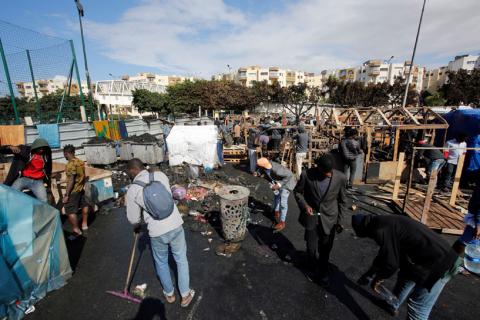Advertisement
African migrants rebuild Casablanca camp destroyed by fire
CASABLANCA, Morocco (Reuters) - After two sleepless days and nights begging on the streets of Casablanca, Guinea teenager Ismail could finally afford to rebuild his home in a temporary camp opposite the city's main bus terminal.
The 18-year-old was among the 1,000 migrants whose tents and belongings were destroyed by a fire late on Saturday, the third at the camp since July 2017. It is unclear how the fire started.
On Monday, Ismail and his camp neighbours began clearing debris, sawing and nailing wooden frames as they began to rebuild the area which last week housed 300 plastic tents.
"I spent Saturday and Sunday night in the street unable to sleep after the fire," said Ismail, who declined to give his full name because he did not want his family to find out about his suffering.
Ismail was one of some 6,000 Africans that were moved by the Moroccan government from the northern city of Tangier and a nearby forest to the country's south in an attempt to stop them crossing over to Spain.
Officials described the moves as a crackdown on illegal trafficking networks. Rights groups have called it forced displacement.
Morocco to Spain has become the gateway to Europe for many African migrants after Italy closed its doors to most asylum-seekers who were entering via Libya.
Ismail, though, had begun heading north again. He lives in Casablanca, a central coastal city and major transport hub, but he wants to keep going north.
"I am planning to stay in Casablanca until I get enough money to go to the north where I can attempt another crossing of the fence of one of the Spanish cities," he said referring to Ceuta and Melilla, two Spanish enclaves.
More than 6,000 migrants have made it to Melilla and Spain’s nearby territory Ceuta so far this year, according to the U.N. refugee agency UNHCR.
Others pay smugglers to get them across the 14 km (9 miles) of sea to Spain.
But until the funds are raised, a temporary home in Casablanca needs to be rebuilt.
James is 26 and arrived in Morocco from Sierra Leone nine months ago after crossing from Algeria. Holding a hammer and nails which he bad bought, he was waiting for one of "the big brothers" to tell him where to build a tent.
The "big brothers" are camp elders representing the different sub-Saharan communities in the camp.
"In fall and winter we need more plastic for the tent's roof and more blankets to feel warm. I hope I will find some before it gets colder," he said, looking at the foggy sky.
(Reporting by Ahmed Eljechtimi; Editing by Ulf Laessing and Patrick Johnston)



















Add new comment